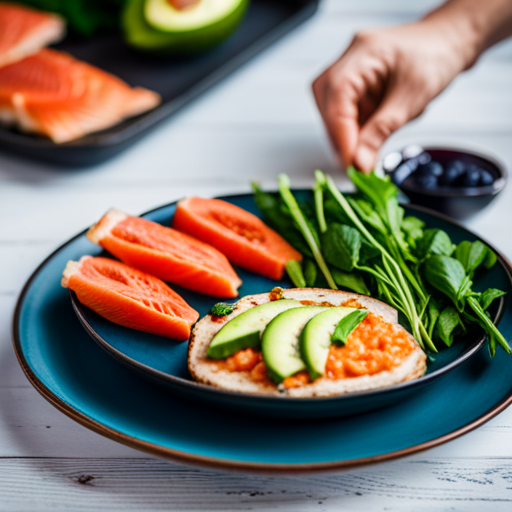Plant-Based Diets for Weight Loss: A Comprehensive Guide
Are you skeptical about whether a plant-based diet can really help you lose weight? Don’t worry, you’re not alone. Many people question whether cutting out animal products can truly lead to effective weight loss.
But let us assure you, a plant-based diet can be a safe and successful way to shed those extra pounds. In this comprehensive guide, we will walk you through the benefits of a plant-based diet, help you understand the basics of plant-based eating, and provide you with essential nutrients to consider.
We will also explain how plant-based diets aid in weight loss and give you tips for planning your own plant-based weight loss journey. Get ready to achieve your weight loss goals with the power of plants!
Key Takeaways
- Plant-based diets can help reduce the risk of chronic diseases and improve overall health.
- Incorporating more plant-based foods and gradually transitioning away from animal products is key to a plant-based diet.
- Legumes, nuts, seeds, and leafy green vegetables are excellent sources of essential nutrients in a plant-based diet.
- Plant-based diets aid in weight loss by promoting portion control, providing nutrient-dense foods, and increasing satiety with fiber-rich options.
Benefits of a Plant-Based Diet
By following a plant-based diet, you can enjoy numerous benefits that contribute to weight loss and overall well-being. Not only does a plant-based diet provide you with a wide range of essential nutrients, but it can also have a positive impact on your health and the environment.
One of the key health benefits of a plant-based diet is its ability to reduce the risk of chronic diseases. Studies have shown that individuals who follow a plant-based diet have lower rates of heart disease, high blood pressure, and type 2 diabetes. This is primarily due to the higher intake of fiber, antioxidants, and other beneficial compounds found in plant-based foods.
In addition to the health benefits, adopting a plant-based diet can also have a positive environmental impact. Animal agriculture is a major contributor to greenhouse gas emissions, deforestation, and water pollution. By reducing our consumption of animal products and focusing on plant-based alternatives, we can help mitigate these environmental issues and promote a more sustainable future.
Understanding the Basics of Plant-Based Eating
To start understanding the basics of plant-based eating, you’ll need to become familiar with the double preposition ‘in into’. This concept refers to incorporating more plant-based foods into your diet and gradually transitioning away from animal products.
Here are four key points to help you understand plant-based nutrition and make a smooth transition to a plant-based diet:
-
Increase your intake of fruits and vegetables: These nutrient-rich foods should form the foundation of your plant-based diet. Aim for a variety of colors to ensure you’re getting a wide range of vitamins, minerals, and antioxidants.
-
Include whole grains and legumes: These foods provide essential nutrients like fiber, protein, and complex carbohydrates. Whole grains include quinoa, brown rice, and oats, while legumes include beans, lentils, and chickpeas.
-
Get your protein from plant sources: Contrary to popular belief, it’s possible to meet your protein needs on a plant-based diet. Incorporate sources like tofu, tempeh, seitan, and edamame, along with nuts, seeds, and nut butter.
-
Don’t forget about healthy fats: While it’s important to limit saturated and trans fats, plant-based sources of healthy fats like avocados, olives, nuts, and seeds can provide essential fatty acids and promote satiety.
Essential Nutrients in a Plant-Based Diet
Incorporate essential nutrients by including a variety of plant-based foods in your diet. A common concern with plant-based diets is whether they provide enough protein. Rest assured, there are plenty of plant-based protein sources available. Legumes like beans, lentils, and chickpeas are excellent sources of protein. Nuts and seeds, such as almonds, chia seeds, and hemp seeds, also provide protein. Incorporating these foods into your meals can help ensure you’re meeting your protein needs.
Another important aspect of a plant-based diet is getting enough micronutrients. Micronutrients are essential vitamins and minerals that your body needs in small amounts. While animal products are often associated with certain micronutrients, it’s possible to obtain them from plant-based sources as well. For example, leafy green vegetables like spinach and kale are rich in iron and calcium. Vitamin C, which helps with iron absorption, can be found in fruits like oranges and strawberries. Nuts and seeds are great sources of zinc and magnesium. By including a variety of plant-based foods in your diet, you can ensure you’re getting the necessary micronutrients.
How Plant-Based Diets Aid in Weight Loss
One key way plant-based diets aid in weight loss is by promoting a higher intake of nutrient-dense foods. By focusing on plant-based foods, you can increase your consumption of essential vitamins, minerals, and antioxidants, while reducing calorie-dense and processed foods.
Here are four ways a plant-based diet can help you achieve your weight loss goals:
-
Fiber-rich foods: Plant-based diets are naturally high in fiber, which helps you feel fuller for longer. Fiber also aids in digestion and helps regulate blood sugar levels, preventing cravings and overeating.
-
Lower calorie density: Plant-based foods tend to be lower in calories compared to animal-based products. This means you can enjoy larger portions of plant-based meals without consuming excessive calories, helping you maintain a healthy weight.
-
Increased nutrient density: Plant-based diets are packed with nutrients, including vitamins, minerals, and phytochemicals. These compounds support overall health and well-being, while providing fewer calories than processed or animal-based foods.
-
Promotes portion control: Following a plant-based diet encourages you to focus on whole, unprocessed foods. This promotes portion control, as these foods tend to be more filling and satisfying, reducing the likelihood of overeating.
Planning Your Plant-Based Weight Loss Journey
Get started on your plant-based weight loss journey by creating a personalized meal plan. Planning your meals in advance can help you make healthier choices and stay on track with your weight loss goals. Meal prepping is a great way to save time and ensure that you always have nutritious options available.
Start by making a list of plant-based foods that you enjoy and that will help you meet your nutritional needs. Include a variety of fruits, vegetables, whole grains, legumes, and plant-based proteins. Next, plan out your meals for the week, taking into consideration your schedule and any dietary restrictions or preferences you may have.
Once you have your meal plan, make a grocery shopping list. This will help you stay organized and avoid impulse purchases. When grocery shopping, stick to the perimeter of the store where fresh produce, whole grains, and plant-based proteins are typically located. Avoid processed foods and sugary snacks.
When meal prepping, consider batch cooking and portioning out your meals ahead of time. This will make it easier to grab a healthy meal when you’re busy or on the go. Invest in some storage containers to keep your meals fresh and easily accessible.
Incorporating Plant-Based Meals Into Your Diet
Start incorporating plant-based meals into your diet by adding more fruits and vegetables to your daily meals.
Here are some practical tips to help you incorporate plant-based meals into your diet:
-
Meal Prepping: Set aside some time each week to plan and prepare your plant-based meals in advance. This will make it easier for you to stick to your diet and ensure that you always have healthy options available.
-
Try New Recipes: Explore the world of plant-based cooking by trying out different plant-based recipes. There are plenty of resources available online that offer delicious and nutritious plant-based recipes to suit every taste.
-
Replace Animal Products: Gradually replace animal products in your meals with plant-based alternatives. For example, swap out meat for tofu or tempeh in stir-fries, use plant-based milk instead of dairy milk in your smoothies, and opt for veggie burgers instead of beef burgers.
-
Experiment with Flavors: Don’t be afraid to experiment with different herbs, spices, and seasonings to add flavor to your plant-based meals. This will help keep your meals interesting and enjoyable.
Incorporating plant-based meals into your diet doesn’t have to be difficult. By meal prepping, trying new plant-based recipes, replacing animal products, and experimenting with flavors, you can create a varied and delicious plant-based diet that supports your weight loss goals.
Tips for Dining Out on a Plant-Based Diet
When dining out on a plant-based diet, you can easily navigate menus and make informed choices to ensure you stick to your dietary goals. Navigating social events and finding plant-based options may seem challenging at first, but with a little planning and knowledge, you can enjoy dining out while staying true to your plant-based lifestyle.
One of the first things you can do is research the restaurant beforehand. Many establishments now offer plant-based options or even have dedicated plant-based menus. Look up the menu online or call ahead to inquire about their plant-based offerings. This will help you choose a restaurant that aligns with your dietary needs.
Once you arrive at the restaurant, don’t be afraid to ask questions. Speak to the server or the chef and let them know about your dietary preferences. They can guide you through the menu and suggest suitable modifications or substitutions. Most restaurants are happy to accommodate special dietary requests.
When it comes to ordering, focus on plant-based options like salads, vegetable-based dishes, or plant protein sources such as tofu or tempeh. Avoid dishes that are heavily processed or contain hidden animal ingredients. If necessary, request modifications, such as removing cheese or dressing, to make the dish plant-based.
Overcoming Challenges and Staying Motivated
To stay motivated and overcome challenges while following a plant-based diet for weight loss, it’s important to set realistic goals and establish a support system. Here are some tips to help you on your journey:
-
Set realistic goals: Start by setting achievable goals that align with your overall weight loss objectives. Break them down into smaller, attainable milestones to keep yourself motivated and focused.
-
Stay positive and celebrate progress: Weight loss is a journey with ups and downs. When you hit a plateau, don’t get discouraged. Instead, focus on the progress you’ve made so far and remind yourself of why you started. Celebrate non-scale victories like increased energy levels or improved digestion.
-
Find support groups: Surrounding yourself with like-minded individuals can make a significant difference in staying motivated. Joining a plant-based diet support group or finding an accountability partner can provide encouragement, tips, and inspiration to keep going.
-
Keep learning and experimenting: Continuously educate yourself about plant-based nutrition and explore new recipes and meal ideas to keep your diet exciting and enjoyable. Experiment with different ingredients and cooking techniques to prevent boredom and maintain enthusiasm.
Plant-Based Diet Success Stories
Setting realistic goals and establishing a support system can greatly contribute to your success on a plant-based diet for weight loss. Hearing plant-based diet testimonials from others who’ve achieved significant transformations can also provide motivation and inspiration on your own journey. These success stories demonstrate that adopting a plant-based diet can lead to positive changes in weight, overall health, and well-being.
One testimonial comes from Sarah, who struggled with her weight for years. After transitioning to a plant-based diet, she lost 50 pounds and experienced a boost in energy levels.
Another success story is Mark, who was diagnosed with high blood pressure and high cholesterol. By following a plant-based diet, he was able to lower his blood pressure and cholesterol levels, leading to improved heart health.
These plant-based diet transformations aren’t only about weight loss. Many individuals have reported improvements in conditions such as diabetes, digestive issues, and inflammation. By nourishing your body with a variety of plant-based foods, you provide it with essential nutrients and antioxidants that can support overall health and well-being.
Next Steps: Sustaining Weight Loss With a Plant-Based Lifestyle
By incorporating these strategies and making conscious choices, you can successfully sustain weight loss on a plant-based lifestyle. Here are some sustainability tips to help you achieve long-term success:
-
Variety is key: Embrace a wide range of plant-based foods to ensure you’re getting all the necessary nutrients. Include fruits, vegetables, whole grains, legumes, nuts, and seeds in your diet. Experiment with different flavors and textures to keep things interesting.
-
Meal planning: Plan your meals in advance to avoid making impulsive food choices. Create a weekly menu and shopping list, and prepare meals in batches to save time. Having healthy, plant-based options readily available will make it easier to stick to your weight loss goals.
-
Mindful eating: Practice mindful eating by paying attention to your body’s hunger and fullness cues. Eat slowly, savor each bite, and listen to your body’s signals. This can help prevent overeating and promote better digestion.
-
Stay active: Incorporate regular physical activity into your routine. Find activities you enjoy, such as walking, cycling, or yoga. Aim for at least 150 minutes of moderate-intensity exercise per week to support weight loss and overall health.
Frequently Asked Questions
Can a Plant-Based Diet Help Prevent Chronic Diseases Like Heart Disease and Diabetes?
A plant-based diet can help prevent chronic diseases like heart disease and diabetes. It offers numerous benefits for disease prevention, including lower cholesterol levels, improved blood sugar control, and reduced inflammation.
Are There Any Potential Drawbacks or Risks to Following a Plant-Based Diet for Weight Loss?
When it comes to following a plant-based diet for weight loss, it’s important to be aware of potential risks. Nutrient deficiencies can occur if you don’t carefully plan your meals.
How Can I Ensure I’m Getting Enough Protein on a Plant-Based Diet?
To ensure you’re getting enough protein on a plant-based diet, focus on incorporating protein sources like legumes, tofu, tempeh, and quinoa into your meals. Planning your meals ahead of time can help ensure you’re meeting your protein needs.
Can a Plant-Based Diet Provide All the Necessary Vitamins and Minerals?
A plant-based diet can provide all the necessary vitamins and minerals if properly planned. However, it’s important to be mindful of potential nutrient deficiencies and ensure you’re getting enough nutrients for both weight management and overall health.
Is It Possible to Gain Weight on a Plant-Based Diet if I Consume Too Many Calories?
Yes, it is possible to gain weight on a plant-based diet if you consume too many calories. Weight gain occurs when you consume more calories than your body needs, regardless of the type of diet you follow.
Conclusion
In conclusion, adopting a plant-based diet can be a practical and effective approach for weight loss. By focusing on nutrient-dense, plant-based foods, you can nourish your body while also shedding excess pounds.
Just like a blooming flower, a plant-based diet can help you flourish and achieve your weight loss goals. With proper planning and motivation, you can sustain your weight loss and enjoy the numerous benefits of a plant-based lifestyle.








